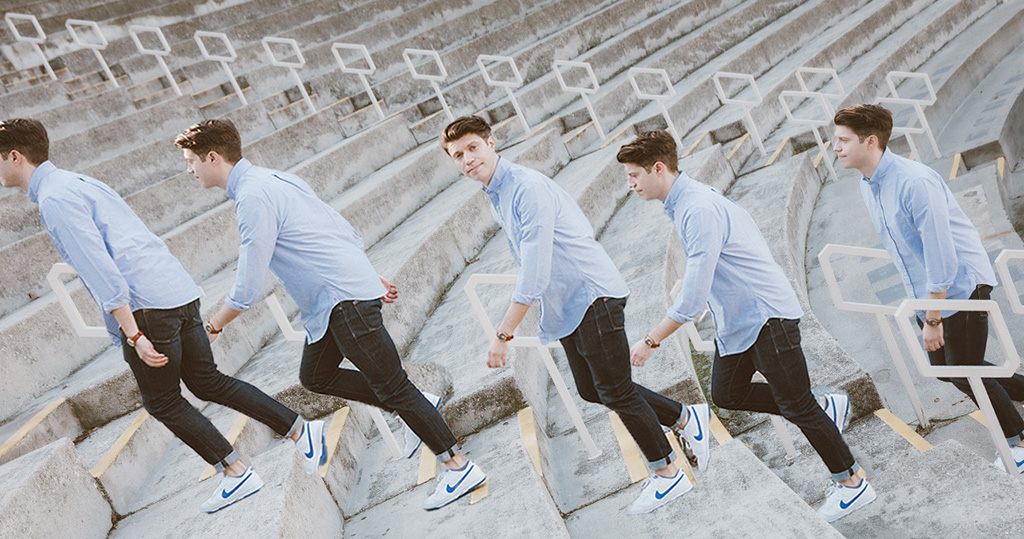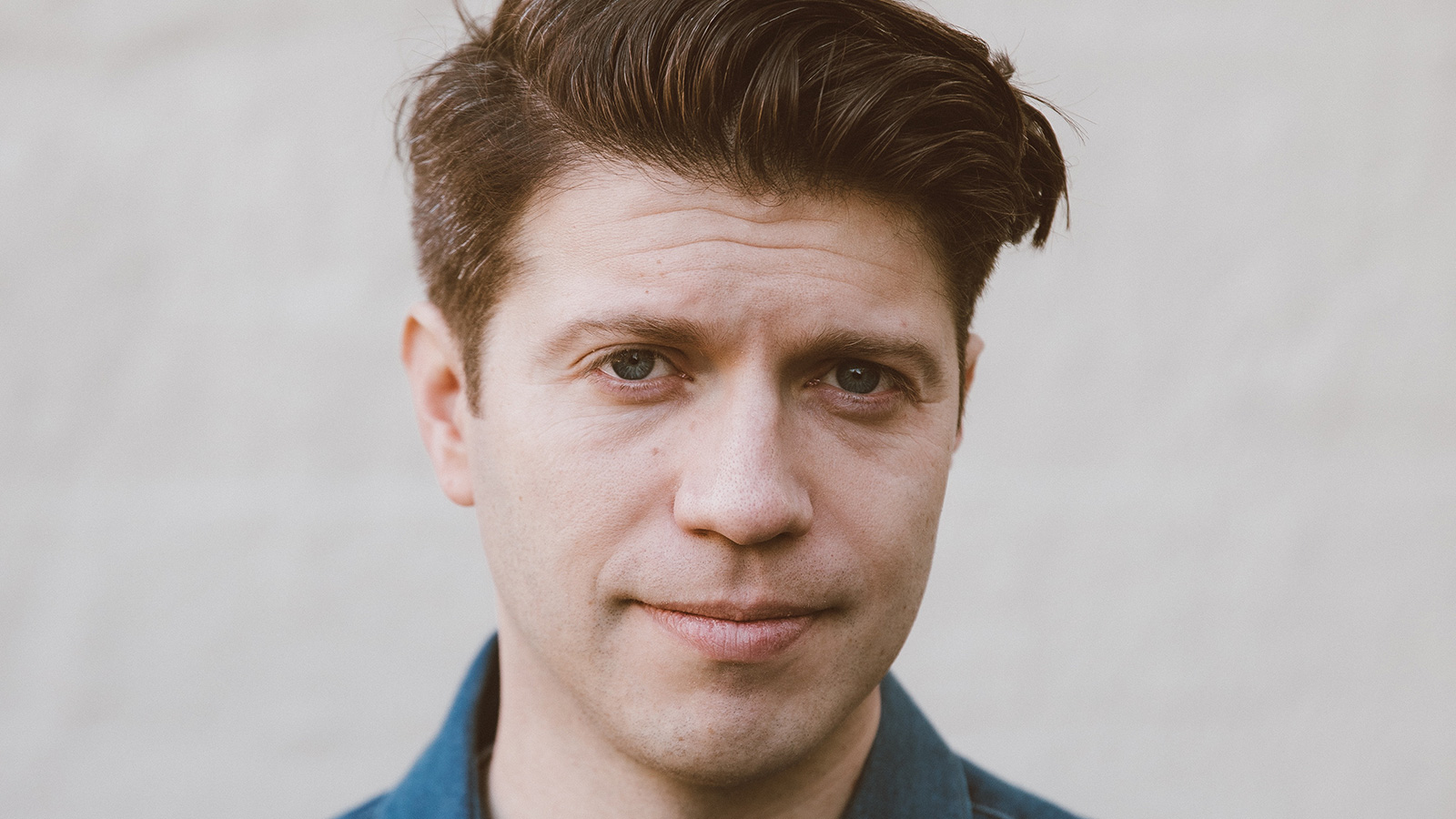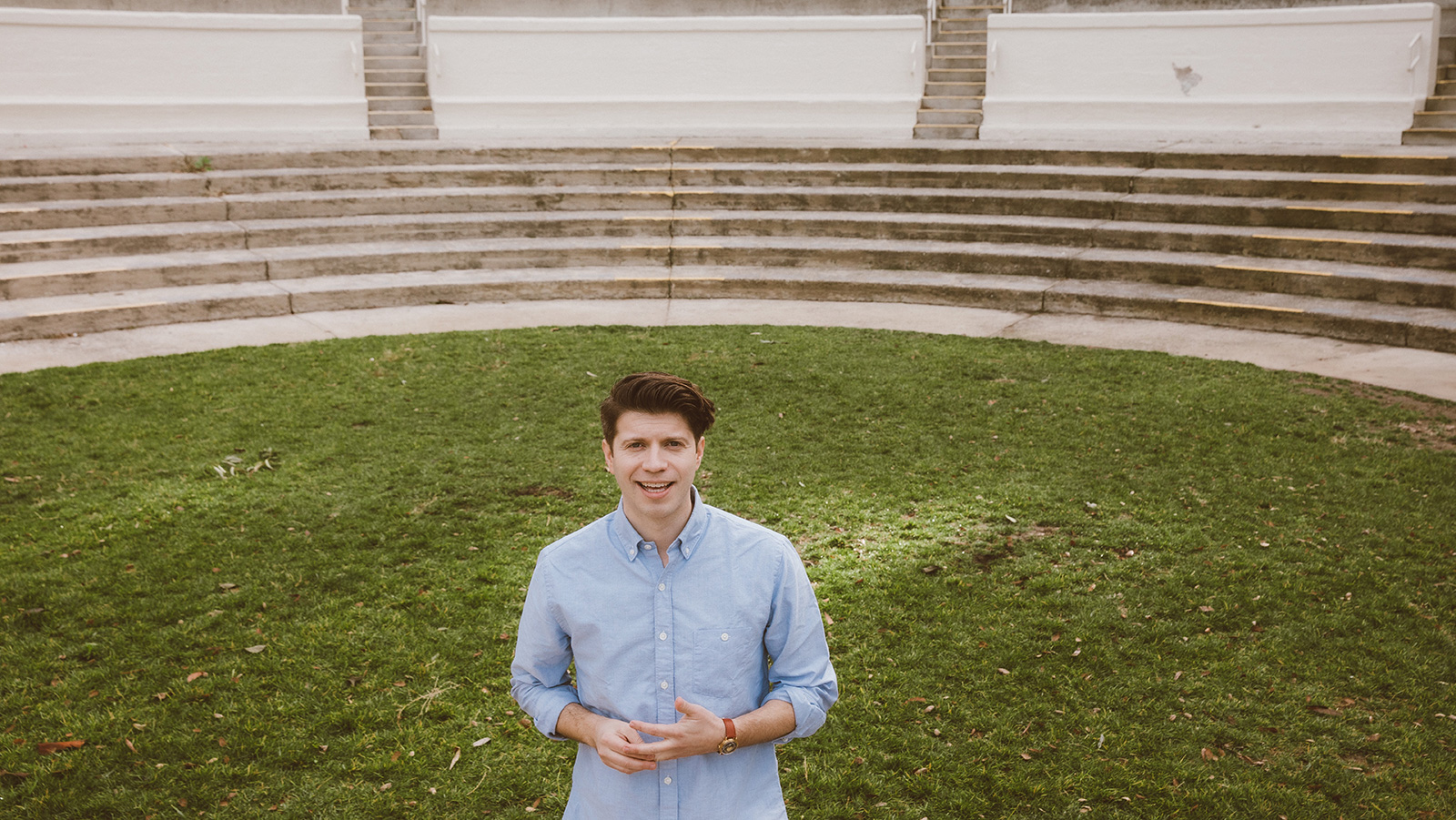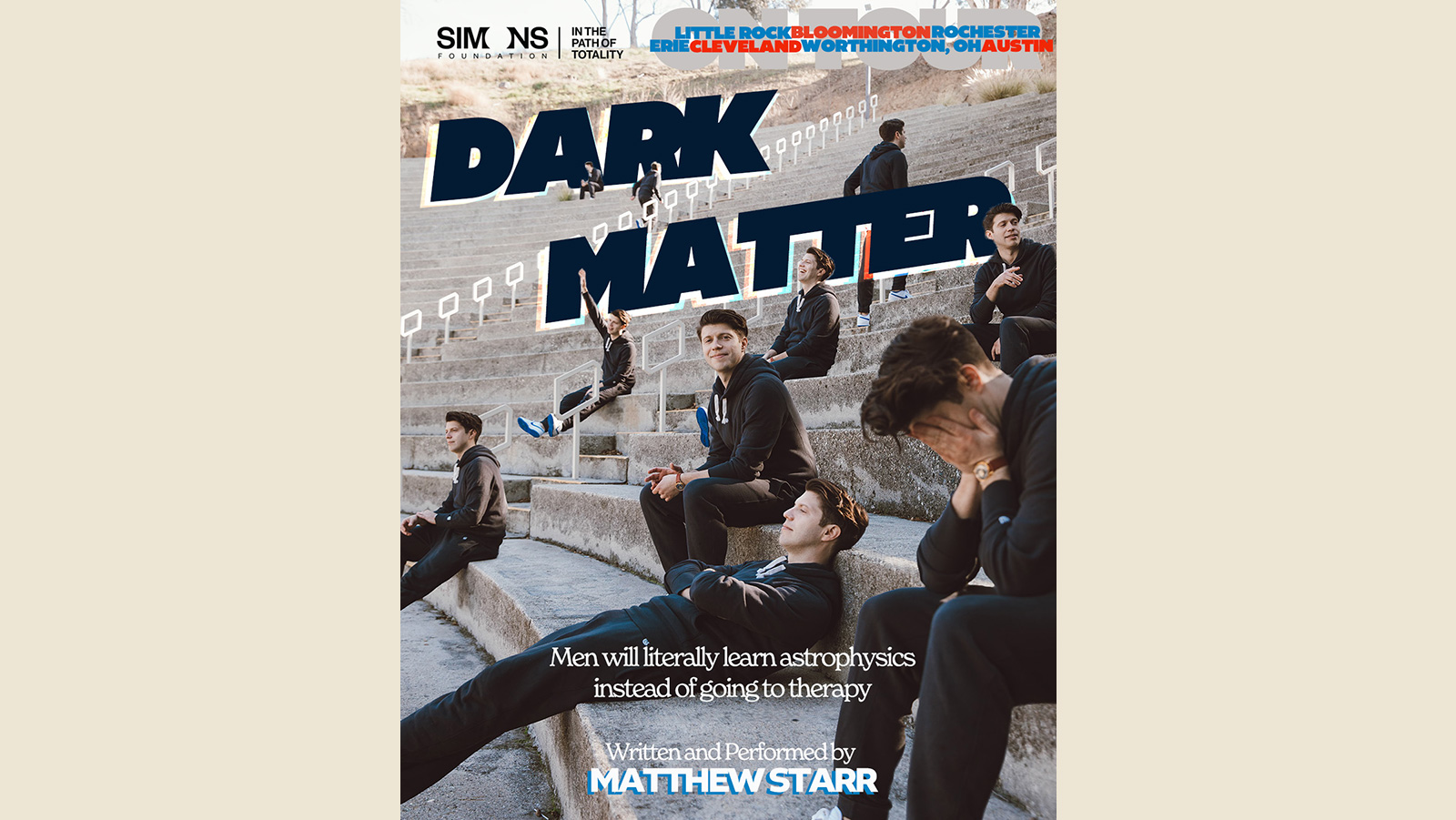
Interview: Matthew Starr
Comedian and writer Matthew Starr is one of the very few comedians who can say they’ve toured a show along the path of a total solar eclipse. But as Starr puts it, “This is exactly the kind of weird reason” he got into comedy in the first place. His show, “Dark Matter,” is part stand-up and part science. He’s performed the show across the U.S. and around the world, with its sold-out debut headlining the 2019 British Science Festival.
Now “Dark Matter” is going through towns from Little Rock, Arkansas, to Bloomington, Indiana, with stops in Austin, Cleveland and more. The show is a personal, thoughtful exploration of relationships and the cosmos. And perhaps most important, it’s hilarious.
As Starr describes it, “If you’ve ever been in a relationship or existed in this known universe, this is the show for you!”
We recently spoke with Starr about “Dark Matter” and his tour along the path of totality. The transcript below has been edited for clarity and brevity.
Hi, Matt! Tell us a bit about yourself.
I am a comedian currently living in Los Angeles, but I’m originally from Ohio. I am right now touring my show “Dark Matter” along the path of totality, and I just had my first show in Little Rock. I love comedy that is hyper-specific in focus, and not only makes people laugh, but also makes people feel things and think.
What’s your favorite memory of the sun?
Growing up, I was a lifeguard in my hometown of Lexington, Ohio, and I think my favorite memory of the sun has to be the summers I spent lifeguarding there. Or, because I lived in landlocked Ohio, any time I’m able to go to the beach. I live in California now, but any time I’m able to go to the beach, I’m always extremely grateful to sit there and take it all in.
What has your relationship been to science throughout your life?
I’ve always been a friend of science. Especially in school, growing up, when your last name is Starr, you get assigned to the solar system automatically. I also remember going to the Center of Science and Industry in Columbus, Ohio, and that was also a big inspiration early on. In college, I made sure I kept studying, even though I was majoring in, let’s be honest, improv comedy. But I always made sure to either read books by Stephen Hawking or to watch documentaries, so it’s always been something that I’ve been fascinated with.
After college, I mostly did improv and sketch at a place called the Upright Citizens Brigade Theatre in New York for basically all of my 20s, and then I wanted to get back into stand-up, and this idea came up for this show “Dark Matter.” I knew enough about dark matter to know that it doesn’t have a single thing in common with you or I. It’s a totally different kind of thing, and I was like, “Wouldn’t it be fun to try to create a show where people feel something about something that they have nothing in common with? Where I help find the common ground, and we explore that? And how we can connect with this thing.” “Dark Matter” was an opportunity to combine my two favorite things, which are comedy and science.
We recently spoke with Starr about “Dark Matter” and his tour along the path of totality. The transcript below has been edited for clarity and brevity.

Can you tell us more about the show? What was the process of creating it like?
I started developing “Dark Matter” in 2018, and it was largely because I had just gone through a breakup, and then had just started dating somebody new, so it was the combination of not wanting to deal with the breakup, and also wanting to impress this new person that led me to think, “Hey, I bet I could write a whole stand-up show about dark matter.” I don’t have a Ph.D., and I’m not a scientist, but I started interviewing science writers, astronomers and cosmologists to learn everything that I possibly could. It was important to me that if you are a Ph.D. in astronomy, or if you have a doctorate in any of these fields, and if you were to come to the show, it wouldn’t be like when you go and see a Star Trek movie, where they’re like, “The red matter will explode,” and it’s like, “Oh, none of this is accurate.” This show is very much inspired by people who inspire me, like Jon Stewart, John Oliver, Jordan Klepper and Samantha Bee — people who are making things that are funny while also engaging your mind. I wanted to see if it would be possible to do that with science. I think some people feel like they need permission to talk about science, and I don’t agree with that.
So I started off self-producing the tour around the United States, and eventually headlined the British Science Festival in 2019. Then the show was all set, and we were going to record it as a special, and it was April of 2020, and you’ll never guess what happened. But then an opportunity came to revisit the show and tie it to the April eclipse. I’ll be honest with you: I always wanted my life to be changed by an eclipse. I always wanted to be like, “Oh, there’s an eclipse happening. The prophecy is coming true.” And a crow or a raven would deliver something to my window. Instead, I got a very nice email from someone from the Simons Foundation asking if I was interested in touring along the path of totality. It’s been really interesting to revisit material and think, “Oh, I’m different than I was in 2018. I’ve learned more, and I look back at that time differently now.”
Can you tell us more about your first show in Little Rock?
Little Rock was amazing! I’d only been to Little Rock once on a road trip, and the only way I had experienced it was that I ate at a very nice Panera Bread there. And it turns out there is way more interesting stuff going on than the Panera. No shade to Panera, what a great place to stop on a road trip! I stayed close to the theater where I was performing, which was called The Joint. Everybody at The Joint was so supportive, and there’s a brewery that’s an In the Path of Totality partner called Lost Forty, that couldn’t have been more supportive, as well as the Main Street nonprofit SoMA 501. I could tell that Little Rock was going to be a friendly town because on social media people were sharing information about the show, collaborating with me on posts and engaging with me.
I used to tour with the Upright Citizens Brigade Touring Company, and we’d go to colleges. Basically, the experience of going to schools as an improviser is, You show up, and nobody cares who you are until after the show. It was such a different experience to have Little Rock say, “Hey, we’re excited you’re coming. We’re excited you’re doing this.” There’s an amazing community of people there that wasn’t on my radar before. Now I love Little Rock.
What are you taking with you from this first experience in Little Rock to your other shows along the path?
I am looking forward to Bloomington, Indiana, which is my next stop. There’s definitely some minor adjustments to the show that I’m making, and I appreciate the opportunity to tailor the show to the space in Bloomington. I learned that the last time there was a total eclipse in Little Rock was 1918, but that might not be true for Bloomington, so I have to do that research. I also enjoy getting to learn about the town.
Also, in Little Rock I got to perform with two local acts named Tina Townes and Jay Jackson, who were both fantastic. I’m in the process of booking acts in Bloomington to highlight people in that community. Each show is different. There’s a part of the show where the audience has to shout things at me, and that’s always different and fun. Little Rock was definitely a confidence booster, so I’m excited to go to Bloomington and have fun there as well.

What was the process of infusing science into your routines like?
There were two sides of it. One of them was me learning the science. The very first conversation I had with an astronomer, I was like, “Great, dark matter, this will probably take 20 minutes for me to get right? I’m a smart person. Let’s go for it.” One of the first lines in the show is, “The first thing to know about dark matter is that it’s not dark, and it isn’t matter.” So I was like, “Maybe this was a bad idea. Maybe I should have chosen something different.” But I didn’t. It took some digging and learning about it.
The other side of it is making sure the jokes are accurate. I was very lucky that I got to develop the show at a place in New York City called Caveat, which was, at the time, run by two people, one of whom was a theoretical physicist. So every time I saw him, I would pull him aside and be like, “Hey, I have a joke, does it work?” And then he would be like, “That part’s true. But this part isn’t.” And then he would be like, “Oh, that part’s true, but it’s not funny.” So there was a lot of hit or miss. I’ve been working on the show since 2018, and you’re always rewriting. I would say that from the 2018 version to now, there are five jokes that survived. So you’re always learning and figuring out better ways of communicating to people.
Is there one science fact that really stuck out to you while you were doing your research?
It’s really how little we know. We can only see and identify five percent of the matter in the universe. So even if you’re sitting there feeling like you know everything, look at the scale and the context that we’re in here. So starting a comedy show from that point was really why I was like, “I could write a whole show about this.” It all comes back to this idea of like, “Hey, we can only see five percent of the universe. And in your day-to-day life, what are the things that you think you know?” And more than likely you’d have no idea.
What are you looking forward to in the next couple of months?
The show in Bloomington, I think, will be a lot of fun. For the shows in Ohio, my parents have already been telling all of their friends to come, so it’ll be fun to talk about some of the stuff in the show that maybe they don’t know about me. I’m really excited, and people at my next stops have already been reaching out. The people in Erie, Pennsylvania, have been amazing, and so supportive. Then I’m performing at Rochester Institute of Technology and will interact with some of the college kids there. Getting to interact with all those people is what makes doing the tour fun. Getting to talk in front of people is great, but it’s about who you’re doing the shows for that’s the really exciting part.
Then, obviously, I’m excited for Austin, Texas, on the day of the eclipse. I’ve actually done the show in Austin before and had an absolutely amazing time. I’m so excited to go to Austin.

What are you looking forward to in the aftermath of the eclipse?
This show has been with me for a long time at this point, and so after the eclipse, and after all my performances, I find it’s nice to take a minute to celebrate the success, and also reflect on the experience of seeing a total solar eclipse. I’m also looking at show dates for “Dark Matter” in New York and Los Angeles, and will also think about what we could do with this show afterwards.
Thanks for the time, Matt.
Thank you!